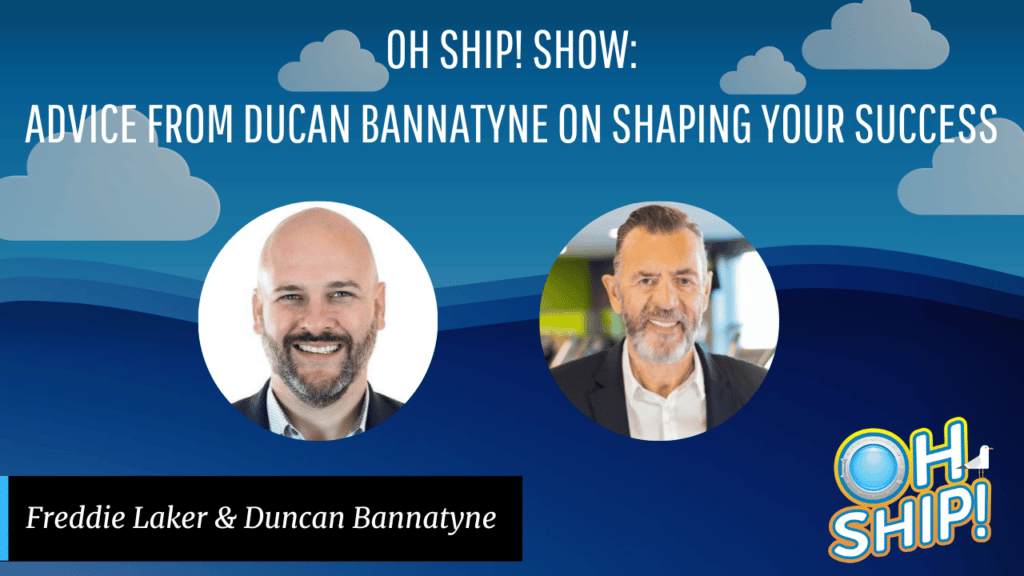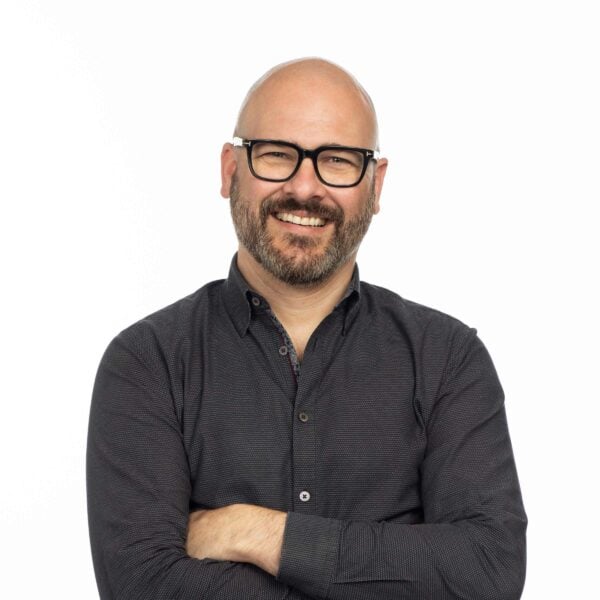Host, Freddie Laker, speaks with Duncan Bannatyne of the Bannatyne Group about succeeding as an entrepreneur
Duncan Bannatyne is OBE, CEO, and chairman of the Bannatyne Group, which operates state-of-the-art health clubs in the U.K. He has also guided countless entrepreneurs over the years, including as a Dragon on Dragon’s Den, the U.K. show that was the inspiration for Shark Tank in the U.S. He joined Freddie Laker on Oh Ship! for an inspiring discussion about defining your own destiny.
Lessons learned: How the advice he didn’t want changed his life
As an entrepreneur, Duncan has learned that unwanted advice can be life-changing—in the most positive way.
In 1987, he was selling ice cream from a van. Then, noticing a promising plot of land for sale, an idea came to him: He could build nursing homes for elderly people. He managed to buy the land and make the idea a reality. “As I looked at the figures, and the people started to move into it, I thought, ‘Why am I driving an ice cream van in the evenings after doing this?’” he says. “And I sold the ice cream business, and that was it—my whole life would change.”
Over the next several years, he would build up the nursing home business. But every week, he had to learn about who had just died—and that took a toll. People were coming in at the last stages of life, and many didn’t have much time left. “Every week, you look at the accounts, and you look at the number of residents you have or patients you have, and you’re red-lining them out because they died; they passed away. And that was a really sad type of business to be in. And so, the advice I was given was to sell it,” he says. “And I said, ‘It’s my business; I love it. I should not sell it.’”
Then he had a breakthrough moment that revealed a more fulfilling path. In 1992, he’d broken his leg and snapped the ligaments in it. As part of the rehab process, he was building up its strength again at the gym. Between reps, he mentally calculated what it would cost to build and how much it would bring in. And then, in 1997, he opened his first gym.
Duncan sold the nursing home business for $52 million. “I moved on, and I’m in a completely different business now, a different environment, an environment I love—the health club business—and it’s fantastic,” he says.
After that sale, he realized he could either pay a 40% capital gains tax or reinvest. So he invested his whole $25 million cut into new businesses: a healthcare business, a hotel business, and a children’s nursery business.
Advice for entrepreneurs: How to decide if a business idea is worthwhile
On Dragon’s Den, Duncan has certainly seen some bad business ideas coming in. “Nobody else is doing it, and they think that means it must be right for them to do it,” he says. “Maybe that’s why [others] are not doing it: because it’s a bad idea.”
Defining your destiny means testing out a concept thoroughly before investing everything in it. “You’ve got to really work out the idea,” he says.
He would also never get involved again with a business he doesn’t enjoy. “There’s a stage in your life where there’s no point in making any more money unless you enjoy it,” he says. “I’m running my life now—I love my life, I’m having a fantastic time. I’m so relaxed.” And that’s partly because he truly enjoys his work. That’s why he left Dragon’s Den when he felt he’d spent enough time listening to other people’s ideas.
How the Bannatyne Group navigated the pandemic
The pandemic was, of course, different from past challenges. Entrepreneurs watched forces beyond their control sweeping in and changing the game in the span of weeks. “It was a shock to the system,” Duncan says. At first, he’d thought it would just last a couple of weeks. Alarmed, they watched their debt rising as they had to shut their health clubs down.
They paid all employees full wages through the first month. But then they had to furlough people. They lost about 15% of their employees but were grateful to be able to keep most of them. In interviews, they affirmed that they’d have to close two loss-making clubs, which naturally frightened employees. But overall, they were fortunate in comparison to some competitors—five of the ten big health cooperatives in the U.K. went into receivership, and one never opened again.
“It was worse than building up a business and seeing your business being collapsed, and then [having] to start again at some point. You can’t start again because you don’t know when it’s gonna start again,” says Duncan, noting that Scotland, England, Ireland, and northern Wales all had different rules about when businesses could open.
He also experienced a grim Oh Ship! moment as the pandemic began. “We also got stranded in the U.K. because we intended to come to America,” he says. “We were one day out, and we got stopped at the airport.” Worse, the hotel they’d been staying at was closing. Fortunately, John Caldwell, a good friend, invited them to stay at his house in London while he was out of town.
A humbling Oh Ship! moment during a business sale
Before he sold the nursing home business in 1997, he’d also been developing a children’s nursery business called Just Learning. He ended up selling it a couple of years later for $22 million.
Some investors were coming from America to meet with him the day he was completing the sale. He took them out to dinner at a place near his lawyer’s office, then ran over to finalize the sale document while they waited for their food. But the back-and-forth with his legal team went on and on. He had his driver take the investors to a club in his Bentley, telling them he’d see them the next day.
“We concluded this sale at 1 o’clock the next morning,” he said. By then, it had started to rain. He asked the lawyer if he could drop him off at home, but the lawyer was going the other way. Then he saw a taxi, so he waved it down. As they approached his big, impressive house, and the gates swung open, he had an unsettling realization: Oh shit—I left my wallet in the Bentley. I can’t pay the guy. He’d also left his keys.
After 15 minutes of knocking, he managed to wake up his wife. But she also had no cash. So he had to take her credit card, get the taxi driver to take him to the nearest bank, and then get dropped off back at home. Fortunately, the driver was quite amused!
Why “an entrepreneur in debt is an entrepreneur in business.”
Freddie recalls Duncan once saying these words. But what does this mean?
Duncan points out that, like most entrepreneurs, when he was building nursing homes and health clubs, he had to borrow money to build them. “The more you borrow, the more if things go up and they go the right way, then the more you’ll make,” he explains. “You’re borrowing the money from the bank at 3%, 4%, 5%—if you’re getting 15% return on your capital, then you’re doing really, really well.” It’s akin to having a mortgage on a house and seeing its value increase.
But you have to do a lot of legwork to make it happen, too, he emphasizes. “Everybody has some luck, but the more you push, the more you try, and the harder you go for things, the more that luck will determine your success. It’s as simple as that,” he says. To define your own destiny, you have to dedicate your life to what you want to do.
You don’t necessarily need a fancy degree, adds Freddie. It’s about finding something you’re skilled at and executing a plan while also being good with clients, reliable, and serious about your craft. “There are a lot of people in this world that would pay top dollar for the people that are top of their craft, no matter what that craft is,” he says.
Making time to make a difference
Duncan also works with two charities, including Operation Smile. He’s funded and gone on about 50 medical trips with them, alongside volunteer surgeons and anesthesiologists who operate on 125 to 150 people with conditions like cleft palates over a five-day period. The whole trip costs just 125,000 to 150,000 pounds because he’s only paying for travel costs like flights and hotels.
He also helped open a home in Romania for HIV-positive children who were abandoned by their parents. And he’s a long-time supporter of Mary’s Meals, which feeds 1 million 300 children around the world while they attend school, encouraging them to get an education as well. They develop partnerships with local people in these places who carry out the work. Along with having a wonderful family life, these projects help make life worthwhile for Duncan!
Did you enjoy this interview? Subscribe and like for more nuggets of wisdom from successful entrepreneurs!








